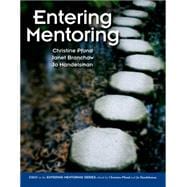Tailored to the primary mentors of undergraduate researchers in any STEM discipline, Entering Mentoring is designed for those who wish to implement mentorship development programs for academic research.

Note: Supplemental materials are not guaranteed with Rental or Used book purchases.
Purchase Benefits
What is included with this book?
Tailored to the primary mentors of undergraduate researchers in any STEM discipline, Entering Mentoring is designed for those who wish to implement mentorship development programs for academic research.
Janet Branchaw is a Faculty Associate at the University of Wisconsin--Madison's Center for Biology Education. She earned her B.S. in Zoology from Iowa State University and her Ph.D. in Physiology from the University of Wisconsin--Madison. After completing postdoctoral training and a lectureship in undergraduate and medical physiology at the University of Wisconsin--Madison's School of Medicine and Public Health, Janet joined the University's Center for Biology Education. Her work at the Center focuses on developing and supporting undergraduate students for graduate school. She developed and directs two National Science Foundation--funded undergraduate research programs; a 10-week summer Research Experiences for Undergraduates program that hosts students from around the country, and a three-year Undergraduate Research and Mentoring program that prepares students in science, technology, engineering, and math disciplines for interdisciplinary graduate training across the biological sciences. In connection with this work she collaborates with the Delta Program for Research, Teaching and Learning and the Wisconsin Program for Scientific Teaching to train pre-faculty and faculty mentors of undergraduate researchers. In addition to her work in undergraduate research, Janet also teaches introductory biology.
Contents
Foreword ix
Preface xi
Acknowledgments xiii
Curriculum Overview 1
Content 2
Format 3
Implementation: Facilitating Research Mentor Training 4
Learning Objectives 6
1 Introduction to Mentor Training 9
Introduction 9
Learning Objectives 9
Facilitation Guide 10
Introductory Activities: Ways to Help Participants Get to Know One Another 13
Constructive and Destructive Group Behaviors 15
Questions to Consider When Writing a Mentoring Philosophy 16
Reading: Mentoring: Learned Not Taught 17
2 Aligning Objectives 27
Introduction 27
Learning Objectives 27
Facilitation Guide 28
Case Study: The Sulky Undergraduate 31
Examples of Mentor-Mentee Compacts 32
Mentoring Tool: Research Experience Expectations 41
Mentoring Tool: Research Experience Reflections 42
Mentoring Tool: Letter of Recommendation 43
Mentoring Tool: Roles for Your Research Matter 44
3 Promoting Professional Development 45
Introduction 45
Learning Objectives 45
Facilitation Guide 46
Examples of Individual Development Plans (IDPs) for Discussing Development and Career Plans 49
Case Study: To Be or Not to Be a PhD 54
Mentoring Tool: The Next Step in Your Career: Factors to Consider 55
4 Maintaining Effective Communication 57
Introduction 57
Learning Objectives 57
Facilitation Guide 58
Case Study: The Slob 61
Mentoring Tool: Reflecting on Your Mentoring Relationship 62
5 Addressing Equity and Inclusion 63
Introduction 63
Learning Objectives 63
Facilitation Guide 64
Diversity Study Results 68
Case Study: Is It OK to Ask? 70
Reading: Benefits and Challenges of Diversity 71
6 Assessing Understanding 83
Introduction 83
Learning Objectives 83
Facilitation Guide 84
“Assessing Understanding” Scenarios 87
Mentoring Tool: Your Research Group’s Focus 88
Mentoring Tool: Scientific Article Worksheet 89
Mentoring Tool: Research Project Outline & Science Abstract 91
7 Fostering Independence 93
Introduction 93
Learning Objectives 93
Facilitation Guide 94
Case Study: Ready Mentee 97
Case Study: The Slow Writer 97
Reading: Mentoring Research Writers 98
8 Cultivating Ethical Behavior 105
Introduction 105
Learning Objectives 105
Facilitation Guide 106
Case Study: Tweaking the Data 108
Case Study: Plagiarism? 108
Case Study: A Big, Strong Guy 109
Case Study: A Drive in the Country 109
9 Articulating Your Mentoring Philosophy and Plan 111
Introduction 111
Learning Objectives 111
Facilitation Guide 112
Mentoring Reflection Worksheet 115
Appendix: Introduction to Facilitation 117
Role of Facilitators 117
General Notes on Facilitating a Group 118
Group Dynamics: Suggestions for Handling Challenges 119
About the Authors 121
The New copy of this book will include any supplemental materials advertised. Please check the title of the book to determine if it should include any access cards, study guides, lab manuals, CDs, etc.
The Used, Rental and eBook copies of this book are not guaranteed to include any supplemental materials. Typically, only the book itself is included. This is true even if the title states it includes any access cards, study guides, lab manuals, CDs, etc.